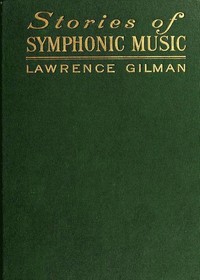Stories of Symphonic Music by Lawrence Gilman
"Stories of Symphonic Music" by Lawrence Gilman is a collection of essays written in the early 20th century that serves as a guide to understanding important symphonic works and orchestral compositions, ranging from Beethoven to more contemporary pieces. The focus of the text is on how music can communicate narratives, emotions, and imagery without the necessity of lyrics, highlighting the expressive potential of instrumental music. The opening of the guide establishes its
purpose as an informative resource for concert-goers seeking to gain deeper insights into the meaning behind various symphonic pieces. Gilman begins by discussing the orchestral composition's ability to convey stories and emotions, asking how an orchestra can narrate tales or evoke imagery through sound alone. He contrasts the evolution of music from the structured, rule-bound compositions of the 18th century to the expressive, programmatic music of the 19th and early 20th centuries, noting that modern composers have begun to use titles and descriptions to inform listeners about the intended themes or emotions associated with their works. This sets the stage for further exploration of specific composers and symphonies that follow in the remainder of the text. (This is an automatically generated summary.)
Read or download for free
| How to read | Url | Size | |||
|---|---|---|---|---|---|
| Read now! | https://www.gutenberg.org/ebooks/57063.html.images | 663 kB | |||
| EPUB3 (E-readers incl. Send-to-Kindle) | https://www.gutenberg.org/ebooks/57063.epub3.images | 542 kB | |||
| EPUB (older E-readers) | https://www.gutenberg.org/ebooks/57063.epub.images | 544 kB | |||
| EPUB (no images, older E-readers) | https://www.gutenberg.org/ebooks/57063.epub.noimages | 459 kB | |||
| Kindle | https://www.gutenberg.org/ebooks/57063.kf8.images | 703 kB | |||
| older Kindles | https://www.gutenberg.org/ebooks/57063.kindle.images | 584 kB | |||
| Plain Text UTF-8 | https://www.gutenberg.org/ebooks/57063.txt.utf-8 | 523 kB | |||
| Download HTML (zip) | https://www.gutenberg.org/cache/epub/57063/pg57063-h.zip | 363 kB | |||
| There may be more files related to this item. | |||||
Similar Books
About this eBook
| Author | Gilman, Lawrence, 1878-1939 |
|---|---|
| Title |
Stories of Symphonic Music A Guide to the Meaning of Important Symphonies, Overtures, and Tone-poems from Beethoven to the Present Day |
| Note | Reading ease score: 68.6 (8th & 9th grade). Neither easy nor difficult to read. |
| Credits |
Produced by Andrés V. Galia, Chris Curnow and the Online Distributed Proofreading Team at http://www.pgdp.net (This file was produced from images generously made available by The Internet Archive) |
| Language | English |
| LoC Class | MT: Music: Musical instruction and study, Composition |
| Subject | Music appreciation |
| Subject | Orchestral music -- Analysis, appreciation |
| Subject | Program music |
| Category | Text |
| EBook-No. | 57063 |
| Release Date | Apr 28, 2018 |
| Copyright Status | Public domain in the USA. |
| Downloads | 348 downloads in the last 30 days. |
| Project Gutenberg eBooks are always free! | |

